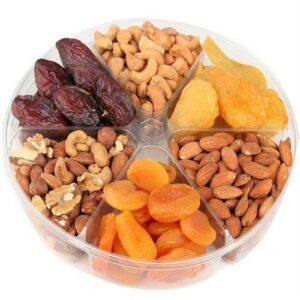Do You Care About Protein-rich Snacks?

A healthy and balanced diet can improve your life in general, not just your energy. You can have a better quality of life by eating whole foods instead of processed foods. Also, eating adequate amounts of protein, healthy fats, fiber, and staying hydrated at every meal will keep you energized and improve your mental health.
Quality nutrition is key, as lack of energy is often associated with stress, poor sleep patterns and anxiety, and metabolic disorders. Make sure you include a variety of foods in your diet and your life will change for the better!
Dates are good snacks: this is because dates is rich in vitamins, fiber and iron, calcium and potassium, each of which is necessary for the body and can even treat anemia. This fruit is also effective for weight loss and can be used as food for diet and prevent the accumulation of fat in the body. It increases the body’s metabolism and strengthens the body’s immune system. People who have respiratory problems and suffer from heart diseases must use this fruit. A serious advice to people who have high blood fat and are unhappy with their excess body fat is that these people must consume Borong Kurma Seri kembangan.
When it comes to healthy eating, there is a lot of focus on added sugars, processed foods, and carbohydrates that are quickly digested and raise blood sugar levels.
But when we realize that the last meal was too light and there is a long time until the next meal – what healthy snacks can provide us with the energy we need throughout the day.
Mary Wirtz, a Colorado Springs-based nutritionist, explains that a good snack should contain at least some protein to help you feel full, and usually the more protein the snack has, the better.
He added: Protein takes longer to digest than carbohydrates, which keeps people full. The ability of protein to help you stay full longer than other macronutrients may be the reason why high protein diets are so popular.
A study published in September 2020 in the Journal of Obesity & Metabolic Syndrome has shown that consuming more protein than recommended in the US Dietary Guidelines can be beneficial for weight loss, especially fat loss and muscle preservation.
Consequently, high-protein diets may also help prevent obesity-related chronic diseases, such as metabolic syndrome, nonalcoholic fatty liver disease, type 2 diabetes, and cardiovascular disease. Of course, there’s also evidence that high-protein diets may also contribute to cardiovascular disease and a shorter lifespan, according to research published in March 2019 in the journal Current Biology. A study published in the journal Nutrients in March 2020 also found that people who eat very high protein diets have an increased risk of developing kidney stones.
It is very important to mention that the source of consumed protein is responsible for many adverse health effects. Some foods, such as red meat or full-fat cheese, are high in saturated fat and should be consumed in moderation. For these reasons, it is often recommended to consume plant proteins that are lower in saturated fat. In fact, a systematic review and meta-analysis published in July 2020 in the journal BMJ found that just a 3% increase in total daily calorie intake from plant proteins could reduce the risk of premature death by 5%.
Another study, published in July 2020 in JAMA Internal Medicine, found that replacing 3 percent of dietary calories from animal protein with plant protein reduced all-cause mortality by 10 percent during that period. It was suitable for both men and women. However, there is still much debate about what amount of protein is considered healthy. According to reports published in Harvard Health Publishing, some recommendations for protein intake are based on body weight (0.8 grams of protein per kilogram of body weight), while others recommend 10% of daily calories. It should be from protein, and some others provide the daily protein intake for men and women in grams.
Gender, age, and level of physical activity all affect a person’s protein needs. According to research published in February 2019 in The Journal of Nutrition, Health & Aging, data shows that one-third of Americans age 50 and older do not get enough protein. These findings also suggest that it’s best to spread your protein intake throughout the day, which is why protein-rich snacks are a good idea.